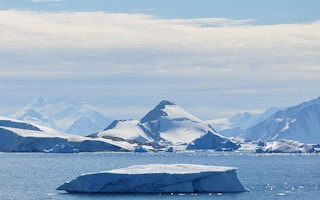Decisions taken this week by just 24 nations and the EU could determine the future of the world’s greatest natural treasure: Antarctica, and more specifically the Southern Ocean which encircles it.
The land, ice and waters of Antarctica are the blue heart of our planet, a global commons that must be protected for the benefit of all humanity and life on Earth. But will the governments meeting at the Commission for the Conservation of Antarctic Marine Living Resources (CCAMLR) – including China – live up to this immense responsibility? That is far from certain.
Three crucial proposals on the table at CCAMLR’s annual meeting in Hobart would create the world’s largest marine protected area (MPA) and preserve over 3 million square kilometres of the Southern Ocean. One is calling for a network of MPAs in East Antarctica, the other for a large protected area in the Weddell Sea and a proposal just submitted to protect waters in the Antarctic Peninsula.
These proposals are the result of years of research and consultations with scientists and Antarctic stakeholders, including the fishing industry, and marine experts insist they are essential for protecting unique wildlife, mitigating climate change impacts, and building globally-significant ecosystem resilience.
The proposals require a unanimous “yes” vote by all 25 CCAMLR members, and geopolitical dynamics at the highest levels are at play. Sadly, scientific recommendations and environmental imperatives do not always align with perceived national interests, and both the East Antarctic and Weddell Sea MPAs have met with resistance.
China and Russia blocked the East Antarctica proposal in 2017 and it is feared this scenario could be repeated this year and potentially extended to the Weddell Sea. But it doesn’t have to be this way. A positive outcome is tantalizingly within our grasp, and China could be the key to unlocking it.
“
Now that we know just how much Antarctica does for us, surely it is high time to give something back.
Flexibility from Beijing helped turn the tide in favour of CCAMLR’s ground-breaking approval of the Ross Sea MPA in 2016, to world-wide acclaim. Now China has a chance to maintain this momentum and cement its status as an environmental leader by voting in favour of the MPA proposals.
By contrast, failing to do so would be directly at odds with its strategy to “understand, protect, and use” the Antarctic, its growing reputation as a climate action trailblazer and its position as the host of the 2020 Convention on Biological Diversity conference.
There is also a bigger picture to consider. Another disappointing outcome at CCAMLR – where the East Antarctica proposal has languished in political stalemate since 2011 – would fuel doubts about this exclusive Commission’s ability to meet its own stated objective of conserving Antarctic marine life, and with good reason.
In 2011, CCAMLR agreed to create a network of large MPAs throughout the Southern Ocean by 2020. We are now approaching the end of 2018, and just two MPAs have been designated: the Ross Sea MPA and a much smaller one near the South Orkney Islands. There is a lot of catching up to do and approving the two proposals would be a huge step in the right direction.
It is vital that all CCAMLR members recognise that their votes have consequences far beyond their own fishing industries or political agendas. All 7 billion people – not to mention future generations – have a stake in the outcome of this meeting. But most of us will not have a representative in the room.
When CCAMLR was created in 1982, to “safely” exploit Antarctic fish and other wildlife, only those countries with a connection to the region through exploration, science or fishing were invited to join. At the time, we didn’t understand that every community on the planet, from the Amazon to the Sahara to the Himalayas, is connected to Antarctica. Now we know.
We know that the cold, oxygen-rich waters around Antarctica drives global ocean circulations of nutrients that are foundation of our entire food web. We know that 70 per cent of the Earth’s fresh water is locked up in Antarctic ice sheets.
We know that Antarctic ecosystems deliver oxygen to the atmosphere and capture vast quantities of carbon. And we know that both local wildlife and planetary processes are at risk from the legal and illegal industrial fishing of krill, squid and fish.
Armed with this knowledge, it is hardly surprising that states that are not CCAMLR members are watching the Hobart meeting, and beginning to question why decisions that affect us all are left in the hands of this anachronistic sub-set of nations. CCAMLR members need to prove that Antarctica is safe in their hands.
Those of us who have had the privilege of exploring the ocean around Antarctica, and seen the Earth’s sparkling heart for ourselves, are imploring all CCAMLR governments to vote in favour of its protection before it is too late.
We have seen with our own eyes that, far from a remote, frozen wasteland, Antarctica is teeming with life, from the tiny krill that are the engine of our ocean’s carbon and food systems, to the blue whales just beginning to recover from a century of slaughter. The Weddell Sea alone is home to 14,000 animal species.
Twelve types of whales have been sighted here, and a third of all emperor penguins are hatched on Weddell Sea ice. East Antarctica is home to 42 per cent of the world’s ross seals and 700,000 Adelie penguins. These beloved species are already severely threatened by climate change: they need our protection.
What CCAMLR members are being asked to agree to this week represent modest proposals. There is a strong case, and growing support, for establishing a 200-mile exclusive scientific zone around the whole Antarctic continent to conserve this relatively untouched, vitally important earth system.
Voting for these well-defined and extensively researched MPAs should be a no-brainer. It is a win-win opportunity for strengthening international relations, accelerating climate action and protecting our ocean.
China was widely credited with triggering the diplomatic breakthrough that ended opposition to the Ross Sea MPA. China – and the entire world – has much to gain from continuing this positive trend. Now that we know just how much Antarctica does for us, surely it is high time to give something back.
Sylvia Earle is an American marine biologist, explorer, author and lecturer. She is an Antarctica 2020 member and society explorer in residence. Earle was the first female chief scientist of the US National Oceanic and Atmospheric Administration.
This article was originally published by chinadialogue under a Creative Commons’ License.


















